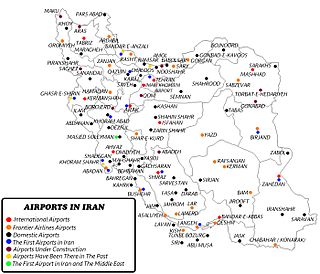
The Federal Aviation Administration (FAA) is a U.S. federal government agency within the U.S. Department of Transportation which regulates civil aviation in the United States and surrounding international waters. Its powers include air traffic control, certification of personnel and aircraft, setting standards for airports, and protection of U.S. assets during the launch or re-entry of commercial space vehicles. Powers over neighboring international waters were delegated to the FAA by authority of the International Civil Aviation Organization.

The National Transportation Safety Board (NTSB) is an independent U.S. government investigative agency responsible for civil transportation accident investigation. In this role, the NTSB investigates and reports on aviation accidents and incidents, certain types of highway crashes, ship and marine accidents, pipeline incidents, bridge failures, and railroad accidents. The NTSB is also in charge of investigating cases of hazardous materials releases that occur during transportation. The agency is based in Washington, D.C. It has four regional offices, located in Anchorage, Alaska; Denver, Colorado; Ashburn, Virginia; and Seattle, Washington. The agency also operated a national training center at its Ashburn facility.

An aviation accident is an event during aircraft operation that causes serious injury, death, or destruction. An aviation incident is any operating event that compromises safety but does not progress to an aviation accident. Preventing accidents and incidents is the main goal of aviation safety.

Aviation safety is the study and practice of managing risks in aviation. This includes preventing aviation accidents and incidents through research, educating air travel personnel, passengers and the general public, as well as the design of aircraft and aviation infrastructure. The aviation industry is subject to significant regulation and oversight.

The Civil Aviation Authority (CAA) is the statutory corporation which oversees and regulates all aspects of civil aviation in the United Kingdom. Its areas of responsibility include:
The Air Commerce Act of 1926 created an Aeronautic Branch of the United States Department of Commerce. Its functions included testing and licensing of pilots, certification of aircraft and investigation of accidents.

The Transport Safety Investigation Bureau (TSIB) is a department within the Ministry of Transport of the Government of Singapore and is an independent investigation authority, responsible for the investigation of air, marine and land transport accidents and incidents in Singapore. The head office is in Passenger Terminal 2, Changi Airport, Changi, Singapore. It was formed on 1 August 2016 as a restructuring of the Air Accident Investigation Bureau (AAIB) of Singapore.

Pakistan International Airlines Flight 268 was an Airbus A300, registration AP-BCP, which crashed while approaching Kathmandu's Tribhuvan International Airport on 28 September 1992. All 167 people on board were killed. Flight 268 is the worst crash of Pakistan International Airlines, and the worst ever to occur in Nepal.

Pakistan Civil Aviation Authority (PCAA) is a state-owned autonomous body under the administrative control of the Secretary to the Government of Pakistan for Aviation, which oversees and regulates all aspects of civil aviation in Pakistan. PCAA's head office is situated in Terminal-1 of Jinnah International Airport in Karachi. PCAA is a member state of the International Civil Aviation Organization. Nearly all 44 civilian airports in Pakistan are owned and operated by the PCAA.

Pakistan International Airlines Flight 688 was a domestic passenger flight from Multan to Islamabad with a stopover in Lahore, operated by Pakistan's flag carrier Pakistan International Airlines. On 10 July 2006, the aircraft operating the route, a Fokker F27, crashed into a mango garden after one of its two engines failed shortly after takeoff from Multan International Airport. All 41 passengers and four crewmembers on board were killed.

The Civil Aviation Authority of the Philippines is the civil aviation authority of the Philippines and is responsible for implementing policies on civil aviation to assure safe, economic and efficient air travel. The agency also investigates aviation accidents via its Aircraft Accident Investigation and Inquiry Board. Formerly the Air Transportation Office, it is an independent regulatory body attached to the Department of Transportation for the purpose of policy coordination.
This is a list of aviation-related events from 2007.

The Federal Aviation Act of 1958 was an act of the United States Congress, signed by President Dwight D. Eisenhower, that created the Federal Aviation Agency and abolished its predecessor, the Civil Aeronautics Administration (CAA). The act empowered the FAA to oversee and regulate safety in the airline industry and the use of American airspace by both military aircraft and civilian aircraft.
A civil aviation authority (CAA) is a national or supranational statutory authority that oversees the regulation of civil aviation, including the maintenance of an aircraft register.
The Directorate General of Civil Aviation (DGCA) is a statutory body of the Government of India to regulate civil aviation in India. It became a statutory body under the Aircraft (Amendment) Act, 2020. The DGCA investigates aviation accidents and incidents, maintains all regulations related to aviation and is responsible for issuance of licenses pertaining to aviation like PPL's, SPL's and CPL's in India. It is headquartered along Sri Aurobindo Marg, opposite Safdarjung Airport, in New Delhi. The Government of India is planning to replace the organisation with a Civil Aviation Authority (CAA), modelled on the lines of the American Federal Aviation Administration (FAA).

South African Airlink Flight 8911 was a positioning flight from Durban International Airport to Pietermaritzburg Airport, South Africa, that crashed into the grounds of Merebank Secondary School, Durban shortly after take-off on 24 September 2009, injuring the three occupants of the aircraft and one on the ground. The captain of the flight subsequently died of his injuries on 7 October 2009.

Airblue Flight 202 was a scheduled Pakistani domestic passenger flight from the country’s largest city Karachi to the capital city of Islamabad. On 28 July 2010, the Airbus A321-231 jet airliner serving the flight crashed into the Margalla Hills, north of Islamabad, while approaching Benazir Bhutto International Airport, killing all 146 passengers and six crew on board. It is the deadliest air accident to occur in Pakistan to date and the first fatal crash involving an Airbus A321.

The Civil Aviation Authority of Islamic Republic of Iran (CAA.IRI), is Iran's civil aviation agency. It is the statutory corporation which oversees and regulates all aspects of civil aviation in Iran. The organization was established in July 1946 and its headquartered at Mehrabad International Airport in Tehran. It investigates aviation accidents and incidents in Iran.

Bhoja Air Flight 213 was a domestic scheduled passenger flight operated by Pakistani airline Bhoja Air from Karachi to Islamabad. On 20 April 2012, the Boeing 737-236A aircraft serving the route crashed in bad weather during its final approach to land. All 121 passengers and 6 crew members aboard were killed. With 127 deaths, it remains as the second deadliest air disaster in Pakistan.














